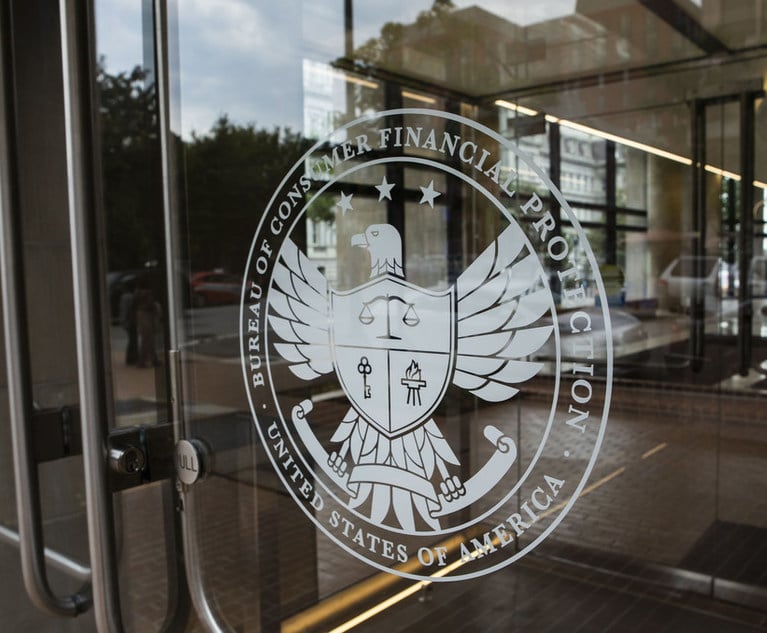Anthem Won't Pay Breakup Fee, Uber Clashes With Regulators (Again), and the Cool Richard Cordray
Anthem Inc. is dropping its bid to acquire rival health insurer Cigna Corp., and the company's stepping up the conflict in refusing to pay a $1.85 billion breakup fee. Uber Technologies and San Francisco tax authorities are fighting over public access to driver names and addresses—the latest confrontation between the ride-hailing company and regulators. And the clock expired on a Republican-led bid, through the Congressional Review Act, to void the Consumer Financial Protection Bureau's prepaid card rule. This is a roundup of regulatory action.
May 12, 2017 at 02:10 PM
28 minute read
With the end of votes Thursday, it became official: A Republican attempt to erase the Consumer Financial Protection Bureau's prepaid card rule had run out of time. The effort failed to come up for a vote before the close of the Congressional Review Act's 60-legislative-day window to undo an agency regulation.
Sen. David Perdue, R-Georgia, targeted the rule, which calls for requiring prepaid card companies—a burgeoning industry—to provide easy access to account information and limit consumer losses from fraudulent purchases, among other measures. But his bill wasn't able to ride the wave of successful resolutions that voided rules rolled out in the final months of the Obama administration.
Could the failure of Perdue's bill embolden the CFPB to finalize its arbitration rule, at the risk of seeing Congress nix its proposal to ban forced-arbitration clauses that prevent consumers from filing class actions? “It shows the CFPB arbitration fight is going to be a knockdown, drag-out event, and we're ready to defend the rule,” said Amanda Werner, the arbitration campaign manager for Public Citizen and Americans for Financial Reform.
The Georgia-based Total System Services and its subsidiary Netspend emerged as the leading opponents of the rule. A provision in the rule requires prepaid card companies to check a consumer's creditworthiness when offering overdraft services. Netspend argued the rule would effectively prevent it from continuing to offer overdraft services.
The CFPB recently delayed the rule's effective date from October 2017 to April 2018. Scott Talbott, the Electronic Transactions Association's senior vice president of government affairs, described the delay as encouraging. Talbott, whose group's membership includes Total System Services, had supported Perdue's bill. “We recognize that it is a blunt tool,” he said, referring to the Congressional Review Act. “But at that point, that was the only tool left to address the concerns with the final regulation.”
Here's a roundup of some other big regulatory action this week:
Anthem's breakup anxiety
Anthem Inc. on Friday said it was dropping its $54 billion bid to acquire rival Cigna Corp. after a judge in Delaware refused to stop Cigna from walking away from the blockbuster merger. Anthem then upped the conflict: The Indiana-based health insurer said it will refuse to pay a $1.85 billion breakup fee to Cigna.
Anthem said in a statement Friday: “In light of yesterday's decision and Cigna's refusal to support the merger, however, Anthem has delivered to Cigna a notice terminating the merger agreement. Cigna has failed to perform and comply in all material respects with its contractual obligations. As a result, Cigna is not entitled to a termination fee. On the contrary, Cigna's repeated willful breaches of the merger agreement and its successful sabotage of the transaction has caused Anthem to suffer massive damages, claims which Anthem intends to vigorously pursue against Cigna.”
Cigna's response: “Anthem was required under the merger agreement to lead the regulatory approval process and to use its reasonable best efforts to obtain regulatory approval. As Cigna has stated, it believes that Anthem willfully breached those obligations and as a result the transaction did not receive the requisite regulatory approvals. Cigna seeks prompt payment of the $1.85 billion reverse termination fee and will pursue our claims for additional damages of over $13 billion against Anthem for the harm that it caused Cigna and its shareholders.”
Anthem, represented by White & Case, earlier failed to convince a Washington judge to bless the merger deal, which U.S. Justice Department antitrust lawyers said would undermine competition in the health insurance market. The U.S. Court of Appeals for the D.C. Circuit in April—dividing 2-1—upheld an injunction that blocked the merger. A team from Paul, Weiss, Rifkind, Wharton & Garrison represented Cigna in the antitrust case in D.C.
The cool Richard Cordray
Republicans and leading business advocates have never had any love for Richard Cordray, the director of the Obama-era Consumer Financial Protection Bureau. “I don't take any of it personally,” Cordray tells the Los Angeles Times in an interview in California. Cordray was in town for a hearing on lending to small businesses.

Photo: Diego M. Radzinschi/ALM
Cordray was asked about this remark from Rep. Jeb Hensarling, R-Texas, when he rolled out a bill to overhaul the Dodd-Frank financial reform law: “I can't do a good James Brown, but I feel good.” Cordray told the L.A. Times: “I'm more inclined toward easy listening, such as the Mamas and the Papas.”
We also know Cordray's a fan of Bob Dylan. Months ago he invoked Dylan lyrics—from the song “Forever Young”—to lift spirits at the agency.
This content has been archived. It is available through our partners, LexisNexis® and Bloomberg Law.
To view this content, please continue to their sites.
Not a Lexis Subscriber?
Subscribe Now
Not a Bloomberg Law Subscriber?
Subscribe Now
NOT FOR REPRINT
© 2025 ALM Global, LLC, All Rights Reserved. Request academic re-use from www.copyright.com. All other uses, submit a request to [email protected]. For more information visit Asset & Logo Licensing.
You Might Like
View All
FTC Finalizes Child Online Privacy Rule Updates, But Ferguson Eyes Further Changes

CFPB Resolves Flurry of Enforcement Actions in Biden's Final Week


'The Tobacco Industry of This Decade': Slew of Class Actions Accuse DraftKings of Creating Addicts
5 minute readTrending Stories
- 1Uber Files RICO Suit Against Plaintiff-Side Firms Alleging Fraudulent Injury Claims
- 2The Law Firm Disrupted: Scrutinizing the Elephant More Than the Mouse
- 3Inherent Diminished Value Damages Unavailable to 3rd-Party Claimants, Court Says
- 4Pa. Defense Firm Sued by Client Over Ex-Eagles Player's $43.5M Med Mal Win
- 5Losses Mount at Morris Manning, but Departing Ex-Chair Stays Bullish About His Old Firm's Future
Who Got The Work
J. Brugh Lower of Gibbons has entered an appearance for industrial equipment supplier Devco Corporation in a pending trademark infringement lawsuit. The suit, accusing the defendant of selling knock-off Graco products, was filed Dec. 18 in New Jersey District Court by Rivkin Radler on behalf of Graco Inc. and Graco Minnesota. The case, assigned to U.S. District Judge Zahid N. Quraishi, is 3:24-cv-11294, Graco Inc. et al v. Devco Corporation.
Who Got The Work
Rebecca Maller-Stein and Kent A. Yalowitz of Arnold & Porter Kaye Scholer have entered their appearances for Hanaco Venture Capital and its executives, Lior Prosor and David Frankel, in a pending securities lawsuit. The action, filed on Dec. 24 in New York Southern District Court by Zell, Aron & Co. on behalf of Goldeneye Advisors, accuses the defendants of negligently and fraudulently managing the plaintiff's $1 million investment. The case, assigned to U.S. District Judge Vernon S. Broderick, is 1:24-cv-09918, Goldeneye Advisors, LLC v. Hanaco Venture Capital, Ltd. et al.
Who Got The Work
Attorneys from A&O Shearman has stepped in as defense counsel for Toronto-Dominion Bank and other defendants in a pending securities class action. The suit, filed Dec. 11 in New York Southern District Court by Bleichmar Fonti & Auld, accuses the defendants of concealing the bank's 'pervasive' deficiencies in regards to its compliance with the Bank Secrecy Act and the quality of its anti-money laundering controls. The case, assigned to U.S. District Judge Arun Subramanian, is 1:24-cv-09445, Gonzalez v. The Toronto-Dominion Bank et al.
Who Got The Work
Crown Castle International, a Pennsylvania company providing shared communications infrastructure, has turned to Luke D. Wolf of Gordon Rees Scully Mansukhani to fend off a pending breach-of-contract lawsuit. The court action, filed Nov. 25 in Michigan Eastern District Court by Hooper Hathaway PC on behalf of The Town Residences LLC, accuses Crown Castle of failing to transfer approximately $30,000 in utility payments from T-Mobile in breach of a roof-top lease and assignment agreement. The case, assigned to U.S. District Judge Susan K. Declercq, is 2:24-cv-13131, The Town Residences LLC v. T-Mobile US, Inc. et al.
Who Got The Work
Wilfred P. Coronato and Daniel M. Schwartz of McCarter & English have stepped in as defense counsel to Electrolux Home Products Inc. in a pending product liability lawsuit. The court action, filed Nov. 26 in New York Eastern District Court by Poulos Lopiccolo PC and Nagel Rice LLP on behalf of David Stern, alleges that the defendant's refrigerators’ drawers and shelving repeatedly break and fall apart within months after purchase. The case, assigned to U.S. District Judge Joan M. Azrack, is 2:24-cv-08204, Stern v. Electrolux Home Products, Inc.
Featured Firms
Law Offices of Gary Martin Hays & Associates, P.C.
(470) 294-1674
Law Offices of Mark E. Salomone
(857) 444-6468
Smith & Hassler
(713) 739-1250








